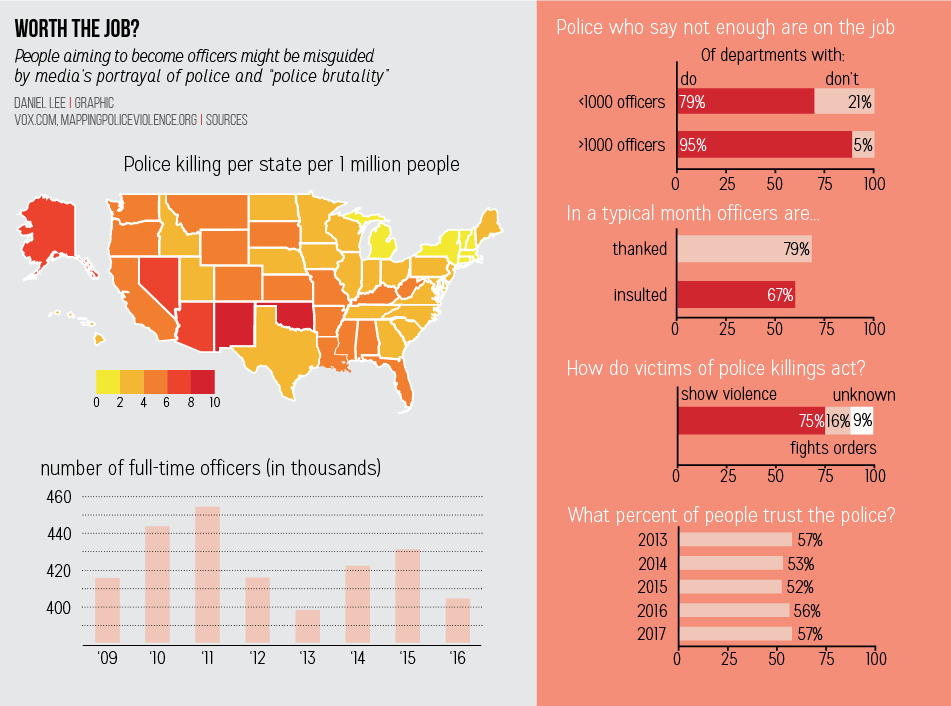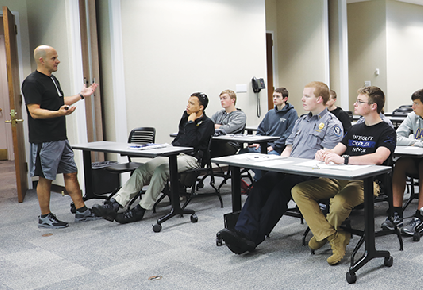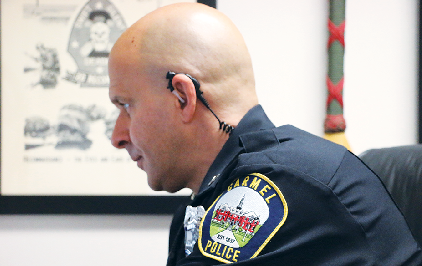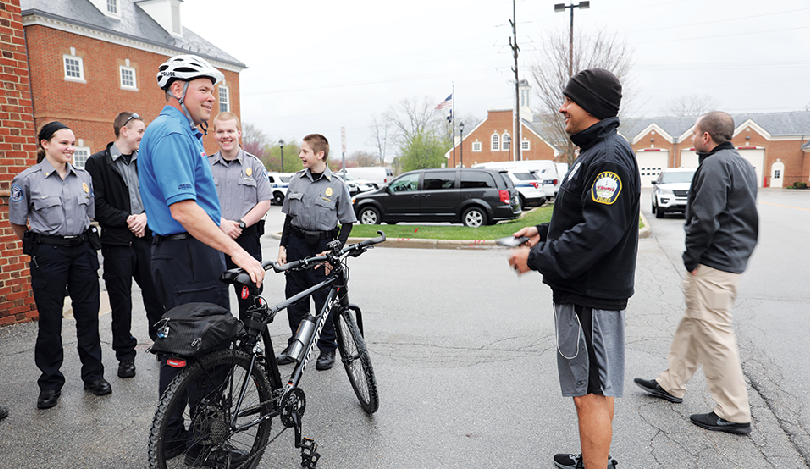Within the last year, the law enforcement community has faced a nationwide police shortage. In Indiana, instructors at the Indiana Law Enforcement Academy said it’s likely law enforcement departments across the state will need more than 100 additional people combined. Some of that shortage may be attributed to the police officers who are killed for simply wearing their uniforms and the negative stigma affecting departments in recent years.

School Resource Officer (SRO) Wendy Bodenhorn said, “In general, people do not want to be police officers as much as they used to, just for the fact of officers are being ambushed and killed at restaurants just because of the uniform they have on, so people aren’t really wanting to get into police work.”
However, in Carmel, the story is different than the rest of the state and nation. According to Bodenhorn, the Carmel Police Department (CPD) is probably right where it needs to be in terms of the number of officers that the CPD has, looking at both the population of the city and the type of crimes that are in Carmel.
In order to resolve the police shortage issue, the CPD offers the Carmel Police Explorer Post, a program which prepares students who want to join law enforcement to gain experience and skills for the future.

School Resource Officer Shane VanNatter
lectures students about police duties. He said Carmel police haven’t been affected much by recent police controversies.
Joseph Hsu, police explorer and junior, said, “We do different police drills, take police standardized testing and fun stuff like shooting off rounds and SWAT team drills. We also do a lot of community service around Carmel. We usually volunteer at events like basketball games and football games, so if you ever see us, we’re the kids in police uniforms directing traffic.”
Shane VanNatter, Explorers Post leader and SRO, said, “(The explorers are) allowed to do a lot of job shadowing. So, explorers can do ride-alongs, where they can ride with an officer on duty, and they have their own uniforms.”
Hsu also said the negative stigma around police recently hasn’t affected his view on law enforcement. In fact, being part of the explorer’s program has only reinforced his positive perception.
“My experience with law enforcement is that police are very kind to people,” he said. “If you don’t have any problems with the police they aren’t going to (do anything) for no reason. Being with law enforcement you see the other side of the story. The common media perception is that police are brought up when something negative happens usually between ethnic or racial tensions. But the fact of the matter is that (when) one police officer in Mississippi who does something (wrong), the blame is put on the entire police force, so it even has effects and consequences here in Indiana.”

Student Resource Officer Shane VanNatter checks his emails on the computer..VanNatter said the explorers are the future of police officers.
VanNatter said he agrees with Hsu.
“First, what you have to realize is from (a citizens’) perspective, you’re getting fed (information) by the media. The media has a job and their job is to sell advertising. They sell advertising by selling very interesting stories, whether they are true or not. They like to take false accounts and put them out there as facts which does hurt the perception of law enforcement. There would be a story about some police brutality incident and then they would barely cover the two officers that were murdered at lunch the other day— literally sitting and having lunch and were murdered because of their uniform and because of their job,” VanNatter said.
VanNatter was referring to the shooting deaths last month of two uniformed police officers who were shot through the window of a Chinese Restaurant in Trenton, Fla.
VanNatter also said he believes the explorers get to see the side of law enforcement the media doesn’t always portray accurately.
“A lot of times, the negative stereotype or consequences of what comes out of the media is very small,” he said. “Most people thank me for what I do, and I think that the explorers get to see that. Let’s say they do a ride-along with me and we stop to have lunch at McDonalds. Then, we have to leave lunch early to go help a motorist who was involved in a crash, and we save somebody’s life and then get a thank you there. That’s the side of law enforcement that (the explorers) get to see. They see that over and over again, the police act professionally, and it’s the behavior of the person getting arrested that causes the problem.”
Hsu said he can see both sides of the issue. “I can see the media’s perspective of, ‘Hey that’s not right,’” he said, “but at the same time, the other perspective is that these guys are just like us; they make mistakes too.”

































![AI in films like "The Brutalist" is convenient, but shouldn’t take priority [opinion]](https://hilite.org/wp-content/uploads/2025/02/catherine-cover-1200x471.jpg)









































![Review: “The Immortal Soul Salvage Yard:” A criminally underrated poetry collection [MUSE]](https://hilite.org/wp-content/uploads/2025/03/71cju6TvqmL._AC_UF10001000_QL80_.jpg)
![Review: "Dog Man" is Unapologetically Chaotic [MUSE]](https://hilite.org/wp-content/uploads/2025/03/dogman-1200x700.jpg)
![Review: "Ne Zha 2": The WeChat family reunion I didn’t know I needed [MUSE]](https://hilite.org/wp-content/uploads/2025/03/unnamed-4.png)
![Review in Print: Maripaz Villar brings a delightfully unique style to the world of WEBTOON [MUSE]](https://hilite.org/wp-content/uploads/2023/12/maripazcover-1200x960.jpg)
![Review: “The Sword of Kaigen” is a masterpiece [MUSE]](https://hilite.org/wp-content/uploads/2023/11/Screenshot-2023-11-26-201051.png)
![Review: Gateron Oil Kings, great linear switches, okay price [MUSE]](https://hilite.org/wp-content/uploads/2023/11/Screenshot-2023-11-26-200553.png)
![Review: “A Haunting in Venice” is a significant improvement from other Agatha Christie adaptations [MUSE]](https://hilite.org/wp-content/uploads/2023/11/e7ee2938a6d422669771bce6d8088521.jpg)
![Review: A Thanksgiving story from elementary school, still just as interesting [MUSE]](https://hilite.org/wp-content/uploads/2023/11/Screenshot-2023-11-26-195514-987x1200.png)
![Review: "When I Fly Towards You", cute, uplifting youth drama [MUSE]](https://hilite.org/wp-content/uploads/2023/09/When-I-Fly-Towards-You-Chinese-drama.png)
![Postcards from Muse: Hawaii Travel Diary [MUSE]](https://hilite.org/wp-content/uploads/2023/09/My-project-1-1200x1200.jpg)
![Review: "Ladybug & Cat Noir: The Movie," departure from original show [MUSE]](https://hilite.org/wp-content/uploads/2023/09/Ladybug__Cat_Noir_-_The_Movie_poster.jpg)
![Review in Print: "Hidden Love" is the cute, uplifting drama everyone needs [MUSE]](https://hilite.org/wp-content/uploads/2023/09/hiddenlovecover-e1693597208225-1030x1200.png)
![Review in Print: "Heartstopper" is the heartwarming queer romance we all need [MUSE]](https://hilite.org/wp-content/uploads/2023/08/museheartstoppercover-1200x654.png)




